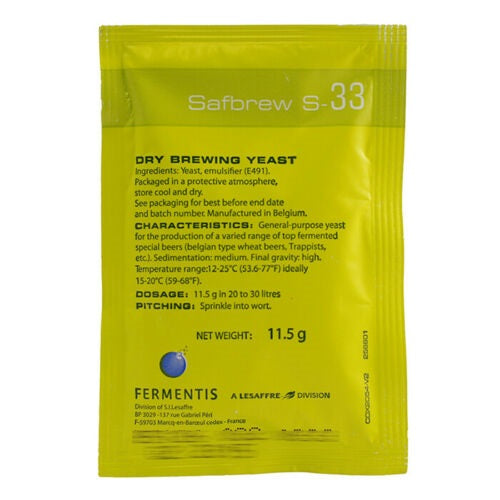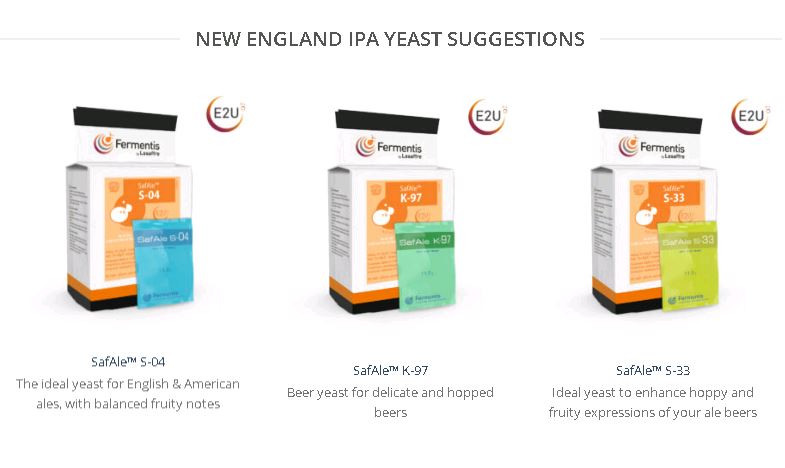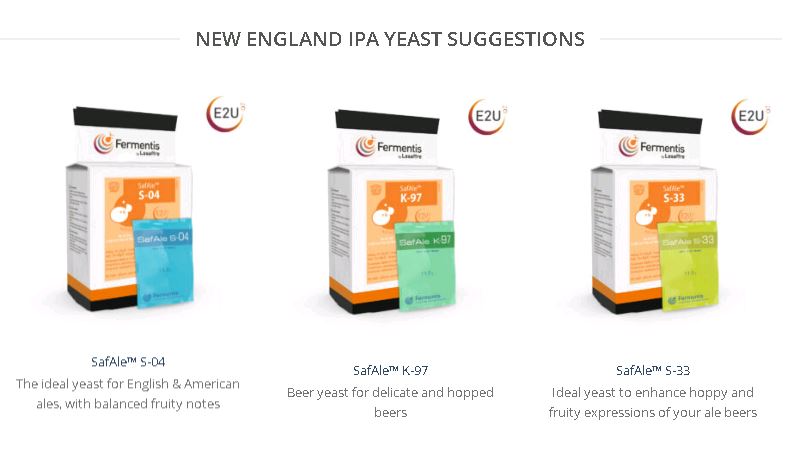Suggested videos
- Sku: 11904-11.5GM
- Barcode:
YEAST S-33 SAFBREW
$6.95 AUD
Tax included.
Shipping calculated at checkout.
In stock!
S-33 SAFBREW
- General purpose ale yeast with neutral flavor profiles. Its low attenuation gives beers with a very good length on the palate. Particularly recommended for specialty ales and trappist type beers.
- Yeast with a medium sedimentation: forms no clumps but a powdery haze when re-suspended in the beer.
- Some recommended styles using S-33 would be NEIPA's, English IPA’s, English Bitters, English Browns and milds, English Pale, Brown Porter, Barleywines, Cream Ale, Old Ale, English Barleywine, Scotch and Scottish Ales, Trappist Single, Belgian Dubbel, Belgian Tripel, Belgian Dark Strong Ale.
Easy To Use - E2U - no rehydration of yeast required.
- Yeast cell viability: no significant difference whether you direct pitch or rehydrate.
- Fermentation performances (kinetic, sugar content, etc…): no significant difference whether you direct pitch or rehydrate.
- Taste & aromas: no impact whether you direct pitch or rehydrate
WHAT ARE THE PROBLEMS THAT CAN OCCUR DURING FERMENTATION? HOW CAN THEY BE HANDLED?
- Many problems can occur during fermentation: wort deficiencies in nutrients, inappropriate fermentation temperatures, contamination issues, etc. Most of the complications listed above can be avoided easily by using right methods of brewing.
- One of the most common risks for brewers is to reuse the yeast. This method (1) can lead to genotype and phenotype deviations over time and (2) requires more manipulations, meaning an increase in the possibility of contaminations. It consequently exposes the wort to a higher rate of stuck fermentation and possible deviations in flavor profiles and beer characteristics. Furthermore, after a first fermentation the yeast enters a critical state with a weak metabolism which increases the yeast mortality rate.
- Fermentation efficiency and quickness are directly affected, the aromatic profile of the final product won’t be the same as earlier – some diacetyl, acetaldehyde, H2S (in case of autolysis) flaws will eventually appear.
- The other issue will be the overload of residual sugars, it will lead the product to a very high saturation after refermentation.
- If there is a real need to recycle the yeast, the solution to minimize all these issues would be to reuse it as soon as the first fermentation is done and with a great level of oxygenation. However, there are still two mains things to consider:
- The wort cannot be deficient in minerals or lipids.A good aeration is needed – but this air supply can also bring contamination if poorly filtered.The other way to avoid these problems will be to use a range of Active Dry Yeasts.
- Brewers are looking for a constant fermentation profile; they’re obviously trying to produce the same beer by reaching the same aromatic profile and kinetic every time. To serve this purpose, active dry yeasts are widely recommended. This type of yeast has a very good aging resistance (over 36 months for Fermentis yeasts) when stored in cool (< 10°C/50°F) and dry conditions.
ACTIVE DRY YEASTS ADDED VALUE
- Reliability
- Sugars are consistently more easily assimilated through the yeasts membranes
- More Sterols are present which permits a better and quicker reproducibility
- Important reproducibility permits a better consistency
- No need of air or oxygen supply, meaning a less exposer and contamination rate
- Genetic consistency
- Investment and space asset utilization
- No need to monopolize a tank to recycle the yeast neither for the propagation step, nor to set up and manage microbiology laboratory operations.
- Easy to Source, Easy to Store, Easy to Use
- In this perspective, Fermentis is continuously developing new fermentation solutions for brewers around the world, whether they are amateur or professionals; and is now establishing its first presence on the Indian market.
- Reliability
- Sugars are consistently more easily assimilated through the yeasts membranes
- More Sterols are present which permits a better and quicker reproducibility
- Important reproducibility permits a better consistency
- No need of air or oxygen supply, meaning a less exposer and contamination rate
- Genetic consistency
- Investment and space asset utilization
- No need to monopolize a tank to recycle the yeast neither for the propagation step, nor to set up and manage microbiology laboratory operations.
- Easy to Source, Easy to Store, Easy to Use
- In this perspective, Fermentis is continuously developing new fermentation solutions for brewers around the world, whether they are amateur or professionals; and is now establishing its first presence on the Indian market.




YEAST S-33 SAFBREW





